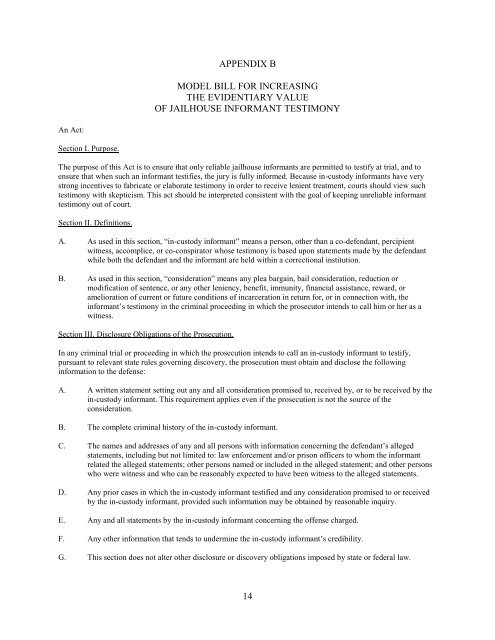attachment_id=996 - UDC Law Review
attachment_id=996 - UDC Law Review
attachment_id=996 - UDC Law Review
You also want an ePaper? Increase the reach of your titles
YUMPU automatically turns print PDFs into web optimized ePapers that Google loves.
APPENDIX B<br />
MODEL BILL FOR INCREASING<br />
THE EVIDENTIARY VALUE<br />
OF JAILHOUSE INFORMANT TESTIMONY<br />
An Act:<br />
Section I. Purpose.<br />
The purpose of this Act is to ensure that only reliable jailhouse informants are permitted to testify at trial, and to<br />
ensure that when such an informant testifies, the jury is fully informed. Because in-custody informants have very<br />
strong incentives to fabricate or elaborate testimony in order to receive lenient treatment, courts should view such<br />
testimony with skepticism. This act should be interpreted consistent with the goal of keeping unreliable informant<br />
testimony out of court.<br />
Section II. Definitions.<br />
A. As used in this section, “in-custody informant” means a person, other than a co-defendant, percipient<br />
witness, accomplice, or co-conspirator whose testimony is based upon statements made by the defendant<br />
while both the defendant and the informant are held within a correctional institution.<br />
B. As used in this section, “consideration” means any plea bargain, bail consideration, reduction or<br />
modification of sentence, or any other leniency, benefit, immunity, financial assistance, reward, or<br />
amelioration of current or future conditions of incarceration in return for, or in connection with, the<br />
informant’s testimony in the criminal proceeding in which the prosecutor intends to call him or her as a<br />
witness.<br />
Section III. Disclosure Obligations of the Prosecution.<br />
In any criminal trial or proceeding in which the prosecution intends to call an in-custody informant to testify,<br />
pursuant to relevant state rules governing discovery, the prosecution must obtain and disclose the following<br />
information to the defense:<br />
A. A written statement setting out any and all consideration promised to, received by, or to be received by the<br />
in-custody informant. This requirement applies even if the prosecution is not the source of the<br />
consideration.<br />
B. The complete criminal history of the in-custody informant.<br />
C. The names and addresses of any and all persons with information concerning the defendant’s alleged<br />
statements, including but not limited to: law enforcement and/or prison officers to whom the informant<br />
related the alleged statements; other persons named or included in the alleged statement; and other persons<br />
who were witness and who can be reasonably expected to have been witness to the alleged statements.<br />
D. Any prior cases in which the in-custody informant testified and any consideration promised to or received<br />
by the in-custody informant, provided such information may be obtained by reasonable inquiry.<br />
E. Any and all statements by the in-custody informant concerning the offense charged.<br />
F. Any other information that tends to undermine the in-custody informant’s credibility.<br />
G. This section does not alter other disclosure or discovery obligations imposed by state or federal law.<br />
14














